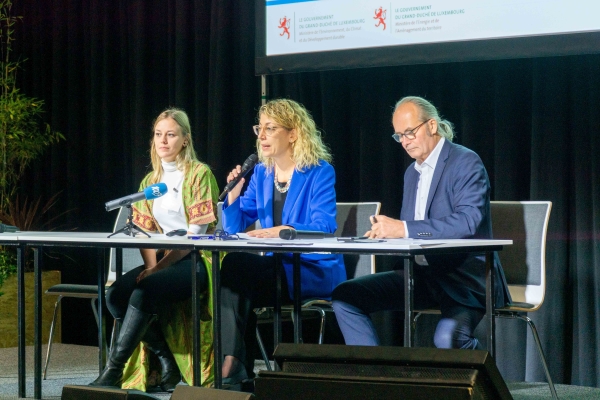 Credit: MECDD
Credit: MECDD
On Friday 7 October 2022, Luxembourg's Minister for the Environment, Climate and Sustainable Development, Joëlle Welfring, and the Minister for Energy, Claude Turmes, presented the state of play of the policy on climate and energy in Luxembourg.
General CO2 reduction target for 2021 achieved
In 2021, greenhouse gas emissions attributed to Luxembourg (excluding the Community emissions trading system) stood at 8.08 million tonnes of CO2-equivalent, i.e. a drop of 20% compared to the reference year 2005.
The sectoral objectives of the transport, agriculture and forestry, and waste and wastewater treatment sectors were met:
- public transport and soft mobility have been significantly developed through the implementation of the Modu 2.0 plan. The electrification of individual and public transport has been accelerated by targeted and attractive financial aid for zero-emission vehicles;
- the expansion and promotion of the charging infrastructure, the electrification of the RGTR regional bus network as well as the establishment of financial aid for the installation of charging terminals for businesses are currently in progress. A reform of the benefit in kind for company cars (leasing) has been put in place. A roadmap for the decarbonisation of the logistics sector is being developed;
- while sustainable forest management is supported by the establishment of a financial aid called "Klimabonus Bësch", the "Eist Holz" initiative aims to establish the link between the sustainable management of our forests and the development of economic activities based on the principles of a circular economy;
- finally, to be mentioned among this non-exhaustive summary of the measures is the development of the circular economy and "Null Offall Lëtzebuerg" strategies, inextricably linked to climate objectives and aimed at considerably reducing the consumption of planetary resources and the production of waste.
Efforts still to be made in the sectors of energy and manufacturing industries, construction and residential and tertiary buildings
There are several explanations for the failure to meet objectives, according to the Ministry of the Environment, Climate and Sustainable Development and the Ministry of Energy and Spatial Planning:
- the increased economic stimulus effect following lockdowns in the context of the COVID-19 crisis;
- the challenges of renovating existing buildings.
In order to address these deficits, the government has already stepped up its efforts in these two areas:
- energy efficiency measures in industry;
- the development of renewable energies has been accelerated: the production of electricity from renewable sources has more than doubled in the last six years;
- a climate pact for small and medium-sized enterprises (SMEs), as well as a roadmap for the decarbonisation of the industry sector will be presented soon;
- the government has put in place new legislation on the energy performance of new buildings and an ambitious renovation strategy;
- financial aid for energy renovation and renewable energies was increased and reinforced during the tripartite.
Minister Turmes said: "The current crisis shows us once again how important climate policy is: it guarantees our security of energy supply and our independence from fossil fuel exporting countries, and helps our planet to remain a livable place for all of us. We will take into account the fact that the industries and buildings sectors have not achieved their objectives when updating the next National Energy and Climate Plan with targeted measures.”
Climate adaptation measures
Climate change is a reality, also in Luxembourg, for which we must be prepared, according to the ministries.
Minister Welfring said: "Climate change has become a reality, we have all experienced it this summer, we have seen it all over the world with fires and floods that have occurred. It is also important that in addition to the efforts we all have to make, we also set ourselves apart in order to adapt to the new circumstances. Everything depends on this: what we do now with efforts to keep the impacts small, what we have to adapt to later".
In 2018, Luxembourg adopted a climate adaptation strategy and thematic plans and programs aimed at adapting and protecting against the consequences of climate change such as floods and droughts. To name a few: the national plan for nature protection, the national plan for sustainable development, the integrated national plan for energy and climate, and the management plan for parts of the international river basin districts of the Rhine and the Meuse located on Luxembourg territory. Finally, the nature pact and the climate pact motivate the municipalities to develop their own adaptation concepts with a "Klimaugepassten Gemengen" certification.
Nature offers many possibilities for adaptation to the climate, according to the ministries, such as:
- the renaturation of rivers, which allows to protect against floods in the event of heavy rains and to protect the rivers from periods of drought;
- heavy rain hazard maps and flood risk maps allows to better prepare for emergency situations;
- mobile applications make it possible to raise awareness and inform citizens: "Meng Loft" which provides information on the quality of the air at the various measuring stations in Luxembourg and the future application "Meng Pegelen" which provides information on the different levels of waters;
- the development of green spaces, green frameworks, green roofs in towns and villages naturally reduces the effect of high temperatures.








